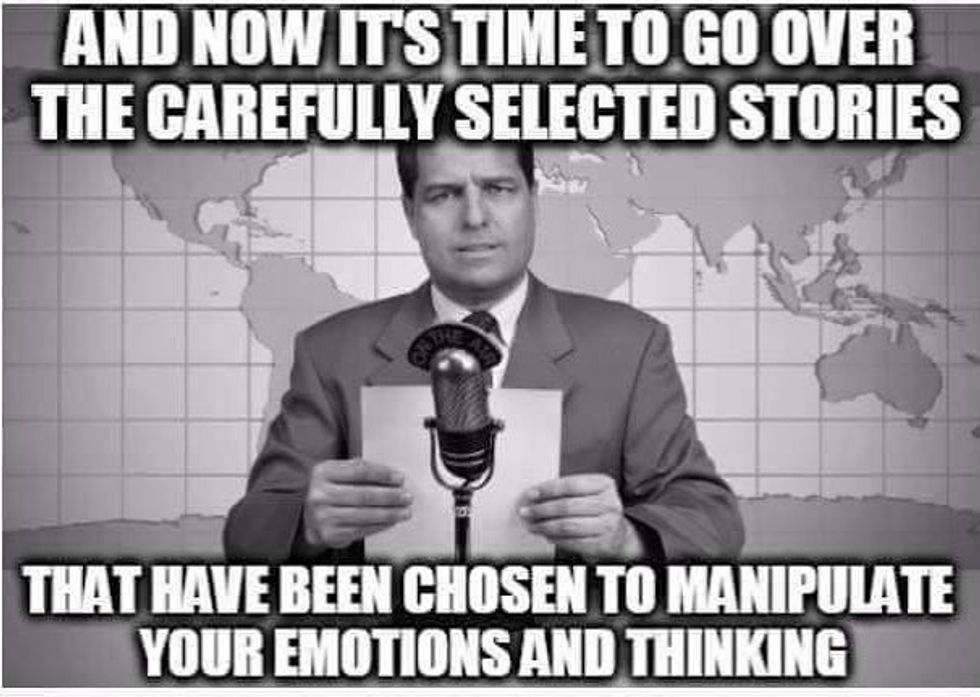Media, according to Google, is “the main means of mass communication.” In short, it’s a mechanism utilized to inform the masses or population of a society. Today our society has tools at our disclosure that early 20th century journalists could only dream of using. The question is, why, with such great assets such as the World Wide Web, is the media becoming more and more unreliable? There once was a time, in the early stage of journalism as an occupation, that a story could not be told as news unless it was complete and unobscured facts. If one wanted to influence the readers/audience towards one way or the other, the section was entitled as an editorial, and it was clear that the opinion of the writer was laced throughout the article. For instance, this article is most definitely laced with my opinion.
Recently I had a quarter-life-crisis. I realized that perhaps being a physician was not the path for me. One of the alternative routes I immediately considered was journalism. I’ve longed to see my name in print for most of my life. His Girl Friday is a classic movie I adore, and most of my historical heroes are writers. Journalism was a perfect alternative path, except for the fact that journalism is no longer laced with integrity.
The definition of propaganda, again, according to Google, is "information, especially of a biased or misleading nature, used to promote or publicize a particular political cause or point of view." Sadly, this definition seems more true to the actions and publications of those posing under the umbrella of media. Anyone who is somewhat conscious knows that our country is constantly in some sort of crises, whether it is warranted or not. However, often I’ve wondered that if the media did its job of simply reporting the news, how much that state of division and crises would change. South Carolina’s State Senator Katrina Shealy said “If we could shut down all media for one month except for the weather reports and let everyone do their job I bet we could see a change.” While this may seem to fall under the “Drastic Measures” column, I do agree that if we kept the stories factually based and only on newspapers and news broadcasts we would see a great change. The most utilized source for news is sadly Facebook. Facebook is a great social network, except when people read a status or a skewed and thrown together article with which they will base their political and/or religious beliefs. A current example would be the Louisiana flooding. Personally, I haven’t seen much publicity for this tragedy on my News Feed other than the articles shared by my friends. (On a side note, I’ll just say, I don’t care if the Governor asks you not to come; the President still shows support in as many ways as possible). In order to stay informed about this tragedy, one must seek out other news sources such as Fox News or CNN. The problem is most people won’t search past their Facebook News Feed for news, and if one does, multiple sources and articles must be read in order to decipher the actual news from the propaganda.
Please don’t mistake me for being naïve on this front. I am aware that politics and the media have long been intertwined, but I believe that as time goes on it is becoming more difficult to distinguish between the two. Pretending the media is not creating mountains out of mole hills (forgive the cliché) is turning a blind eye and careless support and is exactly what politics and government want from citizens. When controversial topics such as “Transgender Bathrooms” becomes the main story, what we as citizens should immediately wonder is what is happening behind the metaphorical political curtain? To those pursuing a career in media, I encourage you to forge ahead with a perspicacious eye. Readers need discernment and honesty from reporters, not agendas and politics. Perhaps I will write for the media beyond the collegiate level, but I doubt a voice such as mine would be published by a mass outlet. I think America would be pleasantly surprised by the peace that could come from separating politics from journalism and simply letting citizens decide their opinion based on reported facts.






















